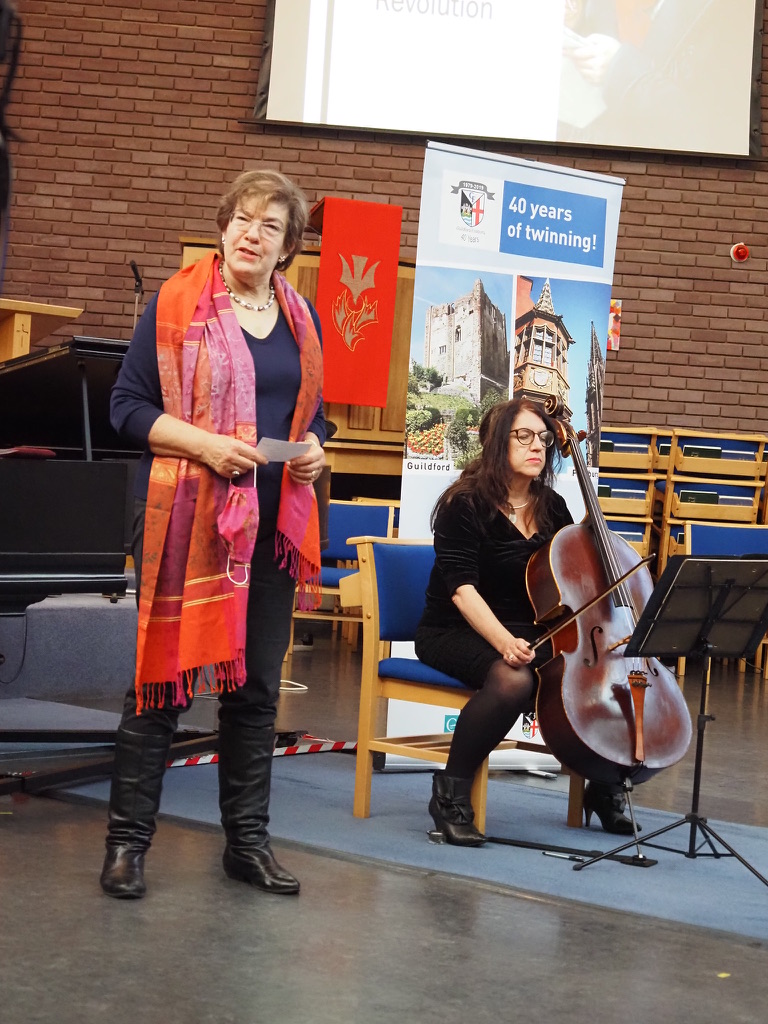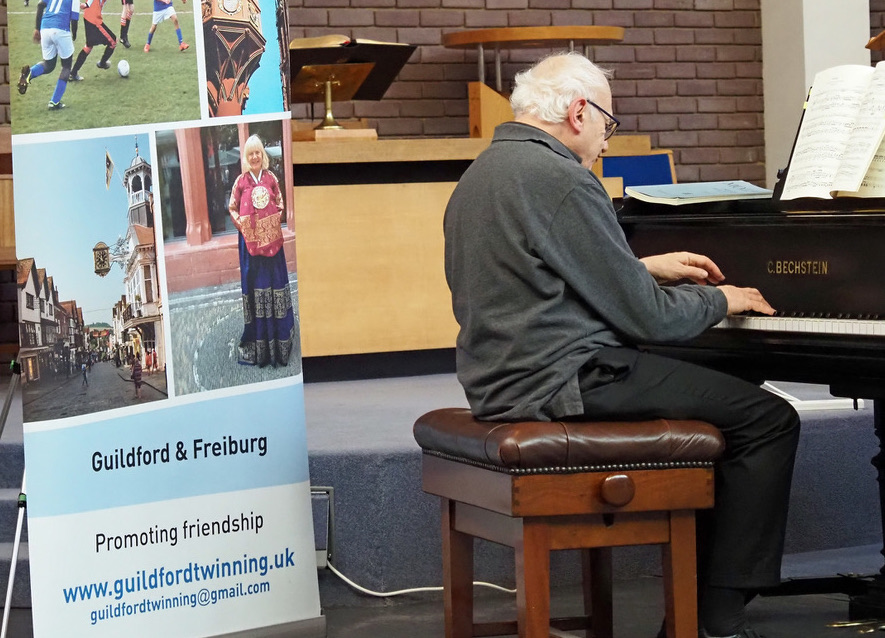 Abraham Lincoln
If given the truth, the people can be depended upon to meet any national crisis...
Abraham Lincoln
If given the truth, the people can be depended upon to meet any national crisis...
 Guildford news...
for Guildford people, brought to you by Guildford reporters - Guildford's own news service
Guildford news...
for Guildford people, brought to you by Guildford reporters - Guildford's own news service
The Magical Mysteries of Beethoven’s Music Performed to Perfection
Published on: 18 Nov, 2020
Updated on: 18 Nov, 2020
Unfortunately, The Dragon was unable to send a reviewer to the Guildford Twinning Association’s annual lecture, so this “unbiased” account is provided by Barbara Ford, chair of the association…
Was Beethoven a classical or romantic composer? What was special, different, revolutionary about his music? How does it differ from that of say, Mozart or Bach?
These questions and many others were answered by Professor Erik Levi in the GTA’s autumn 2020 public lecture, celebrating the 250th anniversary of the composer’s birth. His lecture on October 21 in the Guildford United Reform Church was enjoyed to a tiny masked and socially distanced audience.
The professor traced the composer’s trajectory from tradition to innovation through his five cello sonatas – which were, conveniently for this purpose, spread over his career.
The various points Prof Levi made were illustrated with live musical extracts he played on piano, accompanied by Jo, his wife, a professional cellist.
For someone like me, who likes music but can’t explain why, the lecture was a revelation. To be told what to listen for and to be able to do so immediately was eye-opening or rather, ear-educating.
First, Prof Levi placed Beethoven in historical and musical context, describing the period in which the composer lived and worked, with contemporary and subsequent assessments of his place in musical development. Then came the specifics.
For example, we learnt Mozart, in the slow introduction to violin sonata K454, has the “piano dominant, usually having the more virtuosic material, violin used as a lyrical instrument”, while Beethoven in his slow introduction to cello sonata op.5/1 has “piano still dominant, but cello initiates new ideas”.
And the character of the Mozart piece is “elegant, lyrical, operatic” while in the Beethoven there is “obsessive employment of dotted rhythms (a ploy to flatter King Frederick William II of Prussia)”. Then the Levi duo played the two extracts, so the audience could hear and compare these features for themselves.
By then we knew that Frederick William II, a keen amateur cellist who even took his string players with him on military campaigns, was an important patron who would need flattering.
Now the time came for us to consider the development section of Op.69, where Prof Levi described how Beethoven departed from the tradition of merely expanding on the exposition section, to introduce instead a completely new musical idea.
In Op.69, this was a quotation from Bach’s St John Passion, which the Levis played for us, where Beethoven “transformed from the lyrical and reflective to the violent and defiant in the space of a few bars”, and the Levis played that for us. Magical music.
All this was fairly highbrow stuff, but delivered gently and in such a clear and structured way I found it easy to follow and understand. My appreciation of Beethoven and my pleasure in listening to his works has been enormously enhanced.
You too can share this experience by going online to the GTA’s YouTube channel
 Prof Erik Levi, a GTA member who lives in Guildford, is a distinguished academic musicologist, pianist, music journalist and BBC broadcaster. Jo Levi is a professional cellist, and a GTA member.
Prof Erik Levi, a GTA member who lives in Guildford, is a distinguished academic musicologist, pianist, music journalist and BBC broadcaster. Jo Levi is a professional cellist, and a GTA member.
The Guildford Twinning Association is a voluntary organisation supporting the twinning of Guildford and Freiburg. For more information, and how to join, go to: guildford twinning.uk
See also: Local Covid-19 Stats

Click on cartoon for Dragon story: Public Asked for Views on SCC’s Proposal for Reduced Speed Limits


Recent Articles
- Thousands of Year Six Pupils at Guildford Cathedral for a Special Send Off
- New Surrey Research to Find Solutions to Local Challenges
- Comment: What Are We To Make of the GBC Executive ‘Reshuffle’?
- Bensons for Beds Opens New Store on Guildford High Street
- Local MPs Vote in Favour of Assisted Dying
- Merger Between Reigate & Banstead and Crawley Councils Ruled Out
- ‘Politics Is Not Always a Kind Place’ Says Dismissed Lead Councillor
- Letter: It’s Almost Like We Have Been Abandoned By the Council
- Failure of Woking’s Over-ambitious Project Acknowledged
- Comment: What Can Be Done About Guildford’s Biggest Empty Shop?


Search in Site
Media Gallery
Dragon Interview: Local Artist Leaves Her Mark At One of England’s Most Historic Buildings
January 21, 2023 / No Comment / Read MoreDragon Interview: Lib Dem Planning Chair: ‘Current Policy Doesn’t Work for Local People’
January 19, 2023 / No Comment / Read MoreA3 Tunnel in Guildford ‘Necessary’ for New Homes, Says Guildford’s MP
January 10, 2023 / No Comment / Read More‘Madness’ for London Road Scheme to Go Ahead Against ‘Huge Opposition’, Says SCC Leader
January 6, 2023 / No Comment / Read MoreCouncillor’s Son Starts Campaign for More Consultation on North Street Plan
December 30, 2022 / No Comment / Read MoreCounty Council Climbs Down Over London Road Works – Further ‘Engagement’ Period Announced
December 14, 2022 / No Comment / Read MoreDragon Interview: GBC Reaction to the Government’s Expected Decision to Relax Housing Targets
December 7, 2022 / No Comment / Read MoreHow Can Our Town Centre Businesses Recover? Watch the Shop Front Debate
May 18, 2020 / No Comment / Read More










Recent Comments